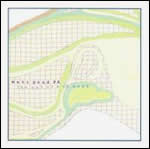|
|
 |
Dusted Reviews
Artist: Matt Pond PA Album: The Nature of Maps Label: Polyvinyl Review date: Jan. 29, 2003 |

|
|
|
 |
National geographic
It is heartening, in light of the international malaise that has come with merely existing recently, to hear a record as simply and distinctly American as Matt Pond PA's The Nature of Maps. Granted, it's not poised to make any reparations for imperialism of centuries past, but it captures an indigenous honesty so modest and sincere that one can't help but remember that this country isn't all SUVs and low-rise jeans. It's not glamorous, defiant, majestic, or revelatory, and for perhaps just that reason The Nature of Maps is really quite a lovely album.
Maps is a pretty straightforward affair; singer Matt Pond (from, yes, Pennsylvania) has written twelve melancholy pop songs and fleshed them out with strings and the occasional banjo and vibraphone. In most ways, little has changed since last January's The Green Fury, but, as its title suggests, this album gives a bit more focus to the vague geographical thread tying Pond's work together. While his sound isn't immediately reminiscent of other artists, it's clear that Pond's influences stay primarily within the boundaries of the USA; whether or not it is, strictly speaking, Maps sounds like music from the heartland, pure, simple, and earnest. Pond's impassioned staccato yelp/drawl recalls Adam Duritz (it's not a bad thing! really!), while his lyrics convey the small-town ennui of Tom Petty's work. Even the Belle and Sebastian-esque strings that sweeten and darken songs like "No More" and "Closer" are filtered through a rustic Elephant 6 sort of nostalgia. And as hazily American as Maps is, its songs named after towns, lyrics about local restlessness, and cartographic artwork make it equally easy to interpret it on a metaphorical — and now political — level.
Underneath a somewhat innocuous appearance, Maps wields ample emotional power, resonating with an unpretentious simplicity through (and, oddly, despite) its lush instrumentation and half-conceptual nature. It is, in fact, ironic that an album preoccupied with the specific geography of maps should be so hard to pinpoint, both regionally and musically. Somewhere between the lonesome crowded west, the rural midwest, and the pastoral east; somewhere between the lush composure of chamber pop and the stirring Americana of Springsteen's heartland rock, lies The Nature of Maps — quietly wistful, humbly triumphant, and eminently charming — with no place in particular to go.
By Daniel Levin Becker
|







